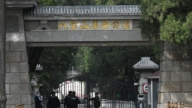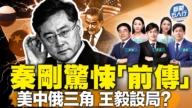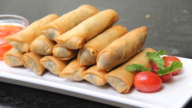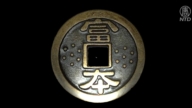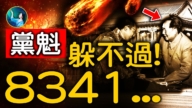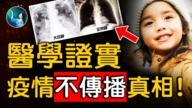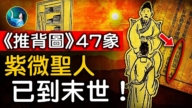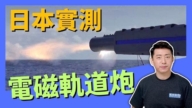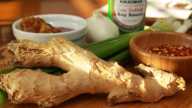【新唐人北京时间2018年09月18日讯】【世事关心】(480)保持台湾独立于中共之战:中国大陆正在进行史上最全面的军备重整,意欲何为?为了影响台湾,中共政府还采取了哪些措施?2019年的国防授权法是否真能助力台湾,并吓阻中共呢?
中国大陆正在进行史上最全面的军备重整,意欲何为?
China is undergoing the most comprehensive military restructuring in its history. What’s the goal?
Ian Easton(2049研究所研究员):“它是对台湾的全面入侵和占领,它是针对中华民国台湾。”
Ian Easton: “It’s the full-scale invasion and occupation of Taiwan, an operation that it would have to conduct against the Republic of China, or Taiwan.”
为了影响台湾,中共政府还采取了哪些措施?
What else is the Chinese Communist regime doing to gain influence in Taiwan?
J. Michael Cole(台湾安全分析师): “台湾是目标。在脸书上,每天有2400条谣言的攻击。每天2400条,全部都来自中国大陆。”
J. Michael Cole: “Taiwan is targeted – on Facebook – is targeted by 2,400 individual disinformation attacks if I can use that term. 2,400 every day, all of which originates somewhere in China.”
2019年的国防授权法是否真能助力台湾并吓阻中共呢?
Is the National Defense Authorization Act of 2019 capable of helping Taiwan and deterring China?
Ian Easton(2049研究所研究员):“有许多非常重要的举措。如果川普政府真能遵照执行,我认为将产生非常非常积极的影响。”
Ian Easton: “There’s a lot of very important initiatives that are in there. And if the Trump administration did act upon all of those, I do think it would make a very, very positive impact.”
萧茗(Host/Simone Gao):欢迎收看《世事关心》,我是萧茗。 从诸多方面来看,鲜有国家像台湾那样对美国的政治制度如此紧密地效仿。美国充满活力的民主制度,重视言论自由和信仰自由。这与中国大陆的独裁专制和一党专政形成鲜明对比。如今,中共在努力加强军备力量,试图颠覆台湾的民主制度。相应的,美国方面正调整对中国大陆的政策,并增进与台湾的关系。这一集的《世事关心》,让我们一起来了解中国大陆、台湾和美国关系的变化。 中国大陆试图怎样颠覆台湾的民主制度,他们将会对台湾采取哪些措施。
Welcome to《 Zooming In》, I am Simone Gao. In many ways, no other nation has followed the United States’ political system as closely as Taiwan. It is a vibrant democracy that values freedom of speech and freedom of belief. It’s a stark contrast to mainland China’s authoritarian, one-party rule. Increasingly, the Chinese Communist Party is ramping up its military and trying to subvert Taiwan’s democratic system. Meanwhile, the United States is overhauling its China policy and increasing relations with Taiwan. In this episode, we’ll take a look at the changing relationship between China, Taiwan, and the United States. We’ll also discuss how China is trying to subvert Taiwan’s democratic system, and what should be done about it.
中国、台湾和美国的关系史
Relations Between China, Taiwan, and the U.S. – a History
1949年中国共产党控制中国大陆后,中华民国政府撤退到台湾。直到20世纪70年代,联合国和一些西方国家还都承认中华民国政府是中国的合法政府。1972年尼克松总统访问中国大陆,最终导致美国与中华民国台湾断交。 1979年美国与北京关系正常化。
China’s Kuomintang (KMT) government fled to Taiwan in 1949 after the Chinese Communist Party took control of the mainland. The UN and Western countries recognized the KMT as China’s legitimate government until the 1970s. In 1972, President Nixon visited China which eventually led to the U.S. severing diplomatic ties with Taiwan and normalizing relations with Beijing in 1979.
尽管与台湾的关系有了变化,美国一直是台湾最大的支持者之一。 1979年,由美国国会起草的《与台湾关系法》要求美国 “向台湾提供防御性武器” ,同时“维持美国的能力,以抵抗任何诉诸武力、或使用其它强制手段,危及台湾人民安全及社会经济制度的行动。” 另一方面,如果中华人民共和国袭击或入侵台湾,该法案并不保证美国将在军事上进行干预。 1982年,里根总统同意六项保证,保证美国继续支持台湾。
Despite the change, the U.S. has always been one of Taiwan’s biggest supporters. In 1979, the Taiwan Relations Act, drafted by the U.S. Congress, requires the United States “to provide Taiwan with arms of a defensive character" and “to maintain the capacity of the United States to resist any resort to force or other forms of coercion that would jeopardize the security, or the social or economic system, of the people on Taiwan." On the other hand, the act does not guarantee the U.S. will intervene militarily if the PRC attacks or invades Taiwan. In 1982, President Reagan agreed to the Six Assurances, which ensured continued U.S. support to Taiwan.
今年二月,川普总统签署了“台湾旅行法”。 该法案允许台美高级官员互访。今年八月台湾(中华民国)总统蔡英文两次访问美国。中共政府因此感到不安。
In February, President Trump signed the Taiwan Travel Act. It allows high-level Taiwan officials to visit the United States and vice versa. Taiwan President Tsai Ing-wen visited the U.S. twice in August (footage of her in TX), angering China’s Communist government.
随着美台关系的增强,其它一些国家却和北京拉近了距离。自2017年以来,已有巴拿马、多米尼加共和国、和萨尔瓦多与台湾(中华民国)断绝了外交关系。目前只有17个国家仍在外交上承认台湾(中华民国)。
As U.S.-Taiwan ties strengthen, other countries are embracing Beijing. Since 2017, Panama, the Dominican Republic, and El Salvador (footage of El Salvador closing TW embassy) have cut diplomatic ties with Taiwan. Only 17 countries currently recognize Taiwan diplomatically.
今年八月,特朗普总统签署了2019年国防授权法案。国防授权法案包含几项亲台措施,比如支持美台举行联合军事演习和对台军援。
President Trump signed the 2019 National Defense Authorization Act in August. The NDAA had several pro-Taiwan elements supporting joint military exercises and support.
萧茗(Host/Simone Gao):2019年的《国防授权法案》是否将帮助台湾维持其国际地位,并阻止中国大陆对其主权的威胁?就该问题我们与2049项目的研究员Ian Easton展开了讨论。
“ Will the 2019 NDAA help Taiwan maintain its international space and deter China’s threat to its sovereignty? I had a discussion with Ian Easton, Research Fellow at the Project 2049 Institute. ”
萧茗(Host/Simone Gao):“今年八月特朗普总统签署了2019国防授权法案,其中有许多在军事领域支持台湾的内容。你认为这样足够吗?”
“ President Trump signed the 2019 National Defense Authorization Act in August, and there were a number of pro-Taiwan military elements in it. Do you think it is enough?”
Ian Easton(2049研究所研究员):“我认为这将是非常积极的。 这里边主要是国会在起作用,国防部只是按国会的要求提供了一份报告。授权法案中的其它内容基本都是国会的想法而已,它展示了我们的抱负、美国民众的愿望、对台湾的支持,以及维护美国在西太平洋的国家利益的决心。国防授权法案非常好,如果你细看一下法案的内容,从支持医院船访问台湾,到重申“台湾关系法”,以及里根的对台六项保证,你就会发现这个法案是美台双方在无邦交情况下,发展彼此关系的基石。法案还支持对台军售制度化,增加对台军售,加强两军之间的最高层沟通。有许多非常重要的举措,如果川普政府真能遵照执行,我认为将产生非常非常积极的影响。然而,我担心,由于长期的官僚惰性,这个过程可能会很慢,所以我不敢说国会的好建议都能在明年付诸实施。”
Ian Easton:“ I think it would be very positive. For the most part is the sense of congress, the only thing that Congress actually mandated the Department of Defense to do is to produce a report. Pretty much everything else in there is the sense of congress. It’s an expression of the aspirations, the hopes of the American people, an expression of support for Taiwan and for U.S. national interests in the western Pacific. But it’s very good. The language, if you look at it and you break down everything from supporting a potential hospital ship visit to Taiwan, to reaffirming the Taiwan Relations Act, and Reagan’s Six Assurances to Taiwan, it’s the bedrock for U.S.-Taiwan relations in the absence of official diplomatic ties. Everything from supporting regularized arms sales to Taiwan, increased arms sales to Taiwan, increased communications at the highest levels between our two militaries. There’s a lot of very important initiatives that are in there. And if the Trump administration did act upon all of those, I do think it would make a very, very positive impact. I worry, however, that because of longstanding bureaucratic inertia, that it may be slow. And so I’m not sure that all of the good things that are suggested by Congress will actually happen over the next year. ”
萧茗(Host/Simone Gao):“台湾在战略上对美国有多重要?”
“ Can you elaborate on just how important Taiwan is to the U.S. strategically? ”
Ian Easton(2049研究所研究员):“对于美国来说,台湾在两个不同的层面上具有重要战略意义。一个层面是原则和价值观。台湾与美国是志同道合的国家。它是一个民主国家,它推崇言论自由、宗教自由、集会自由,它认同美国理念的所有核心内容,认同我们自开国以来的全部历史。这些是美国凝聚力的来源,也是我们历史上成功的基础。台湾政府、中华民国政府在这些理念和价值观上与我们有共识。从另一层面来讲,排除价值观考虑,台湾具备地缘战略的重要意义。这是我们冷静、理性地计算如何维持美国的权力,影响力经济实力而得出的结论。如果你看一下台湾的位置,它位于第一个岛链的中间,这是一个关键的地理位置,它坐落在世界上交通最繁忙的海上通信线路和通信航空公司之间,它占据了重要的地缘战略地形,在这个基础上,美国根本不能失去这个台湾。”
Ian Easton: “Well, for the United States, Taiwan is important strategically on two different levels. One is the level of – it’s really the level of principles and values. Taiwan is a like-minded country for the United States. It’s a democracy, it values freedom of speech, freedom of religion, freedom of assembly, all of the core elements of American principles, all the things that our Founding Fathers and all the generations that have come since then, all of the intrinsic values that we have, the things that we hold to be sacred as a nation, and all the things that have made us very, very successful as a nation, the Taiwanese government, the Republic of China government, agrees with. Also, as a matter of geostrategic interest, this is less about values and more about our own cold, rational calculations of how do we maintain our power and our influence and our economic prosperity. If you look at Taiwan, its location, it’s situated in the middle of the first island chain, which is critical geography. It sits at the nexus of the world’s most heavily trafficked maritime lines of communication and airlines of communication. It occupies essential geostrategic terrain. This is a place that the United States simply cannot afford to lose on that basis as well. ”
萧茗(Host/Simone Gao):“美国怎么能真正帮助台湾而不仅仅是摆个姿态呢? 例如,美国削弱与因中国而放弃与台湾交好的那些国家的外交关系是个好办法吗?”
“ How can the United States really help Taiwan instead of just making symbolic gestures? For example, do you think downgrading the U.S. diplomatic relations with countries who dump Taiwan diplomatically for China is a good way to help Taiwan maintain its international space?”
Ian Easton(2049研究所研究员):“我想任何时候美国政府,特别是近期非常配合北京政权的美国国务院,无论何时他们抗议,或对北京政权,或向那些与北京靠拢的国家或公司进行外交抗议,我认为都是好事。然而,话虽如此,我仍然觉得美国政府因不满或失望就对外宣泄愤怒是不公平的,因为这些国家包括美洲中部和南美国家,他们在经济、政治、和外交上受到巨大的压力。对于美国这个世界上最强大的国家而言,针对这些国家发怒毫无意义,因为问题的核心目标和根源是中华人民共和国,是北京。不负责任采取行动的是北京,是北京正在改变台湾海峡和世界各地的现状。北京正在孤立和疏远台湾,在世界舞台上摧毁台湾。因此,至少在我看来,对于美国政府,特别是国务院来说,更直接地表达对北京政权的不满和失望更合适。而不是去针对南洲中部和南美国家而表示不满与失望也许将来还涉及非洲或南太平洋国家。”
Ian Easton: “Well, I think anytime the United States government, and especially the U.S. State Department, which until recently have been very, very accommodating to the regime in Beijing, anytime that they protest, anytime that they demarche the Chinese or they demarche countries or corporations or organizations that are cooperating with Beijing, I think that’s a good thing. However, having said that, I think that it is not fair for the U.S. government to take its own anger out, if that’s what it is, or its own disappointment out on those particular countries because we’re talking about countries in Central America and South America who are under tremendous stress economically, politically, and diplomatically. And it makes little sense for the United States, the strongest country in the world, to use those countries, and in effect to bully those countries when the true target of the problem, the root of the problem is the People’s Republic of China. It’s Beijing. It’s Beijing that is acting irresponsibly. It’s Beijing that is changing the status quo in the Taiwan Strait and around the world. It’s Beijing that is isolating and alienating Taiwan and silencing Taiwan on the world stage. And so it would make more sense, at least in my own opinion, for the U.S. government, and the State Department in particular, to express its dissatisfaction and its disappointment with the regime in Beijing directly, and not to go after smaller countries in Central America or South America, or in the future it could be Africa or in the South Pacific. ”
Coming Up: China’s strategies to influence Taiwan.
接下来,中国大陆对台湾的渗透策略。
中国共产党利用文化活动、媒体、教育项目、和民间交流来影响世界公共舆论。在台湾,中共正试图渗透台湾政治和社会。
The Chinese Communist Party uses cultural activities, the media, education programs, and people-to-people exchanges to influence public opinion around the world. In Taiwan, the CCP is trying to infiltrate Taiwanese politics and society.
在今年9月11日的布鲁金斯学会活动中,台湾安全分析师J. Michael Cole讨论了中共如何利用社交媒体获取影响力并破坏台湾民主党政府。
At a Brookings Institution event on September 11th, Taiwan-based security analyst J. Michael Cole discussed how the CCP uses social media to gain influence and undermine Taiwan’s Democratic government.
J. Michael Cole(台湾安全分析师):“这几年我们观察到的比较大的事件之一就是造谣,是假威廉希尔体育官网的比较学术化的说法,这个说法这几年才被使用。我们看见在信息化的宣传,使用社交媒体散布谣言的显着增加。我们知道,台湾的脸书使用人口比例是全球最高的。所以脸书就成了台湾的谣言散布的主要场所。很多是本地产生的,但是也有越来越多的来自中国。来自中国的谣言有时候,或是很多时候,被台湾本地的有类似想法的人或团体推波助澜。所以我们不能说百分之百针对台湾的谣言都是来自中国。话虽如此,现在台湾正进行一些研究,由台湾青年科技精英所做的。他们现在做的不仅是确认谣言的类型、散布场所和谣言主题,他们也在调查谣言的来源。一份初步的报告显示,每一天台湾都是目标,在脸书上,每天有2400条谣言的攻击。每天2400条,全部都来自中国。这背后的原因,为什么我们相当肯定说谣言来自中国,是因为在大陆黄金周期间,谣言的攻击急剧下降,这很说明问题。这些谣言的攻击的绝大部分,目标是攻击台湾的民主、台湾的机构,当然是试图颠覆蔡英文总统和政府的形象和名声,还有民进党。还有,传播所谓历史必然性,抵抗历史大势是没用的,所以台湾人应该如何如何,还有加强来自北京的信号和信息,领导人习近平说了什么,和台湾有关的。造谣的人越来越熟练,早些时候,台湾人还能分辨出这些很可能是谣言,因为有时中国大陆的用词方式不一样,即使两岸都使用同一种语言,但是很多术语不一样。所以他们现在似乎在台湾雇人,谣言的内容和制造机构仍在大陆,雇用年轻的台湾人,制造虚假威廉希尔体育官网内容,目标是台湾民众,这样这些谣言听着就很像了,听着很台湾,因为是台湾人生产的。”
J. Michael Cole: “Well, one of the big things that we’ve seen in recent years is disinformation, which is a more academic term for fake news. That’s a term that’s caught on in recent years. We’re seeing a marked increase in computational propaganda, disinformation operations using social media. As we know, Taiwan has the highest penetration of Facebook users on the face of the planet. So Facebook has been a very important playground for disinformation in Taiwan, a lot of which is generated domestically, but also there’s an increased component coming from China, which sometimes, or often times, is also reinforced by like-minded individuals and groups in Taiwan as well. So we cannot claim the all the disinformation being aimed at Taiwan is coming out of China. That being said, there are a number of studies that are being conducted in Taiwan by Tech Savvy, Young Taiwanese, and what they are trying to do now is not only to identify the type of disinformation, where it is being shared, and the subjects that they are working on, but also doing the investigation to trace it back to its origin. One of the preliminary reports demonstrates that, on a daily basis, Taiwan is targeted – on Facebook – is targeted by 2,400 individual disinformation attacks if I can use that term. 2,400 every day, all of which originates somewhere in China. And the reason why, with a certain amount of certainty, we can argue that it comes out of China is that during Golden Week the number of attacks tends to drop dramatically. That’s a bit of a telltale sign. And most of these attacks are aimed at discrediting Democracy in Taiwan, its institutions, certainly trying to undermine the image and reputation of President Tsai Ing-wen and her administration, as well as the DPP, but also encouraging myths of inevitability, resisting the forces of history is futile, therefore the Taiwanese should blah, blah, blah, and augmenting any signaling and messaging coming from Beijing, anything that President Xi – or leader Xi Jinping says, as well, pertaining to Taiwan. They’re getting better at it. Earlier, Taiwanese consumers of disinformation could tell that it probably was disinformation because the Chinese terms that were being used were quite different sometimes, even though the two sides use the same language, but they use different terminology and whatnot. So now what they are doing is they seem to be hiring people in Taiwan, content farms and disinformation units in China, hiring young Taiwanese to generate false news content aimed at a Taiwanese audience. So now it sounds legitimate, it sounds Taiwanese because it is produced by Taiwanese.”
除了造谣宣传,中共还试图渗透台湾地方协会,以绕过台湾政府官方组织。
Narration: In addition to disinformation, the CCP is also trying to infiltrate local grassroots organizations in order to bypass Taiwan’s governmental organizations.
J. Michael Cole(台湾安全分析师):“他们正在吸纳农业协会、吸纳年轻个人、学生、渔民组织、文化组织、寺庙、佛教寺庙,最近他们建立了两个协会——海峡两岸广东交流协会和台南市海峡两岸交流促进会。这真是讽刺,他们在台南民进党的铁杆粉丝的腹地设立这样的组织。还有一件很有意思的事,‘白狼’张安乐在2013年6月,在大陆流亡十多年之后回到台湾。他最早开张的竞选办公室也是在台南,现任行政院长赖清德当时还是市长,这些组织和政党所作的,基本就是绕过中央政府的机构,在台湾的草根和当地组织之间建立联系,还有和大陆的对等机构取得联系。这些很大程度是由于北京意识到,共产党不能寄希望于同民进党合作达成共产党的目标。但是越来越多的你会听到中共内部有声音说,国民党也不再是统一台湾可以合作的对象了。”
J. Michael Cole:“ What they are doing is recruiting agricultural associations, recruiting young individuals, students, fisherman organizations, cultural organizations, temples, Buddhist temples, and they are establishing – well, two associations that they’ve established recently is the Cross-Straight Guangdong Exchange Association and the Tainan Cross-Straight Exchange Promotion Association. That’s very ironic that they would set up one of these organizations in the heartland of DPP support in Tainan. Also very interesting that when ‘White Wolf’ or Chang An-lo came back to Taiwan after more than a decade in exile in China in June 2013, one of the first campaign offices that he opened was also in Tainan, when William Lai, who is currently premier, was still mayor. What these organizations and parties are doing is basically bypassing central government organizations altogether and facilitating connectivity between grassroots, local organizations in Taiwan and dealing directly with their counterparts back in China. Much of this stems from the realization in Beijing that the CCP simply cannot hope to accomplish what it wants by working with the DPP, but more and more you will hear voices in the CCP who also claim that the KMT is no longer the counterpart that they were banking on for unification with Taiwan.”
美国和台湾如何应对中国的军事威胁?
Coming up: How the U.S. and Taiwan are countering China’s military threat.
中国对台湾的军事威胁
China’s Military Threat to Taiwan
北京方面在台湾传播假消息并渗透地方协会,同时积极增强自身军事力量。 根据2018年《向中华人民共和国提出的军事和安全发展年度报告》,人民解放军正在进行史上最全面的改革,以成为一支能够进行复杂联合作战的部队。人民解放军努力具备打赢“信息化局部战争”的能力,局部战争需要实时的数据网络的指挥和控制、以及精确的打击。改革旨在简化指挥和控制结构,促使各级的协作能力全方位提升。中国的军事现代化目标,是为了降低美国的核心运作优势与技术优势。为了实现现代化目标,中国采用各种方法获取外国军事技术和军民两用技术,包括瞄准外国在华直接投资,网络盗窃以及利用有途径接触这些技术的个人。此外,随着中国在全球足迹的扩张和中国在外国的利益扩大,其军事现代化计划更加侧重投资和基础设施建设,以支持在中国以外的一系列任务,包括力量投射、海道安全、反海盗、维和等。
While Beijing is spreading disinformation and infiltrating local associations in Taiwan, they’re also building up their military capabilities. According to the Annual Report to Congress on Military and Security Developments Involving the People’s Republic of China in 2018, The PLA is undergoing the most comprehensive restructuring in its history to become a force capable of conducting complex joint operations. The PLA strives to be capable of fighting and winning “Informatized local wars” – regional conflicts defined by real-time, data-networked command and control, and precision strikes. Reforms seek to streamline command and control structures and improve jointness at all levels. China’s military modernization targets capabilities with the potential to degrade core U.S. operational and technological advantages. To support this modernization, China uses a variety of methods to acquire foreign military and dual-use technologies, including targeted foreign direct investment, cyber theft, and exploitation of private Chinese nationals’ access to these technologies. Additionally, as China’s global footprint and international interests have grown, its military modernization program has become more focused on investments and infrastructure to support a range of missions beyond China’s periphery, including power projection, sea lane security, counterpiracy, peacekeeping, et cetera.
萧茗(Host/Simone Gao):中国大陆增强军事力量对台湾意味着什么?让我们再来听听Ian Easton的分析。
What does China’s military buildup mean for Taiwan? Here’s Ian Easton again.
萧茗(Host/Simone Gao):“2015年,中国领导人习近平在中国开展了大规模军事改革。 目标是什么,这对台湾意味着什么?”
“ In 2015 Chinese leader Xi Jinping initiated a massive military reform in China. What was the goal, and what does that mean for Taiwan?”
Ian Easton(2049研究所研究员):“这是一个非常好的问题。我们所看到的是,在12月31日,这项改革计划开始实施,这项大规模的改革和重组计划已经启动。它一直持续到今天,显然改革的最后期限是2020年。改革的既定目标是建立一支有能力的联合人民解放军。我所关注的问题,以及我所知道的许多人所关心的问题,是当中国共产党谈论一个有能力的联合军队时,根据他们自己的学说,根据他们自己的著作,他们真正在谈论的是一支实际入侵和占领台湾的军队。因为如果你看看中国自己的文献,只有一个行动真的需要一个有能力的联合军队,这不是与印度的边界冲突,它不是朝鲜半岛的冲突、它不是对台湾的封锁、也不是针对台湾的空中或导弹运动,而是对台湾的全面入侵和占领。它是针对中华民国台湾、台湾军队进行的行动。而且还可能要求台湾准备阻止、延迟、最终试图摧毁将被命令前来台湾救援的美国军队。”
Ian Easton: “Well, that’s a very good question. What we have seen is, in December 31st, this reform program started, this massive reform and reorganization program started. And it’s continued until today, and apparently the stated deadline of the reform is the year 2020, and the stated objective of the reform is to build a joint capable People’s Liberation Army. And the concern that I have, and the concern I know that many share, is that when the Chinese Communist Party talks about a joint capable military, what they’re really talking about, according to their own doctrine, according to their own writings, is a military capable of actually invading and occupying Taiwan. Because if you look at the Chinese, their own literature, there’s only one operation that would really require a joint capable military, and it’s not a border conflict with India, it’s not a conflict on the Korean peninsula, it’s not a blockade of Taiwan, and it’s not an air or missile campaign against Taiwan. It’s the full-scale invasion and occupation of Taiwan, an operation that it would have to conduct against the Republic of China, or Taiwan, Taiwanese military, but also an operation that would require them to prepare to deter, to delay, and ultimately to attempt to destroy the U.S. military forces that would be ordered to come to Taiwan’s rescue.”
萧茗(Host/Simone Gao):“习近平表示,到2035年将实现与台湾的统一。您认为,美国是否应该认真对待这一声明?”
“ Xi jinping indicated that unification with Taiwan will happen by 2035. In your opinion, should the U.S. take that statement seriously? ”
Ian Easton(2049研究所研究员):“绝对需要。我认为,任何时候世界上第二大国的领导人发表这样的声明,我们都应该认真对待,这是一个公之于众的威胁,他们打算做什么一目了然。但此刻,我不认为他们直接且明确的发出了这种威胁的讯号,但我肯定这是他们的长远目标。我不确定他们是否已经制定了到2035年的时间表,我想他们希望人民解放军在2035年之前就 准备就绪 。有报导称中共中央政治局常委会在2008年,然后又在2012年的第18次党代表大会上两次要求人民解放军,做好在2020年前对台湾全面开战的准备。”
Ian Easton:“ Absolutely. I think we should take it seriously any time the leader of the world’s second most powerful country makes a statement like that. That is a not unveiled threat. It’s very clear what they intend to do. They’re signaling their intentions. I don’t know that, in this particular case, that he was that direct in terms of exactly how he put it, but I do think that is certainly their long-term intentions. And I’m also not sure that they have a timeline that extends out to 2035 in terms of this mission. I think they want the PLA to be ready even before 2035. In fact, well before 2035. There were reports that came out starting in 2008, and then again it was repeated in 2012 at the 18th Party Congress that the PLA was ordered by the Politburo Standing Committee to be prepared to carry on a full-scale, all-out war against Taiwan by the year 2020. ”
萧茗(Host/Simone Gao):“你认为特朗普政府或前任政府是否已经意识到中国对台湾的计划?”
“ Do you think the Trump administration is aware of China’s plan towards Taiwan?”
Ian Easton(2049研究所研究员):“目前尚不清楚美国政府的最高级别是否意识到这一点。我确信我们的军事规划人员熟悉我们所面临的这一战略问题,而且我们的情报界也很清楚。但是,如果你看看我们的高层面的政策行为,就能看出我们的政策制定者对这一战略挑战的思考不是很清楚。而且我认为这可以理解,因为政策制定者必须花费他们大部分的时间和注意力来解决他们面临的日常危机。今天的重大威廉希尔体育官网是什么?我们今天要面对什么问题?这个问题更像是一个长期的挑战,所以我认为,政策制定者会说如果我今天不必担心这个问题,我不必此刻面对它。”
Ian Easton: “It’s not clear that the highest levels of the U.S. government are aware of this. I’m sure that our military planners are familiar with this strategic problem that we face and that our intelligence community is aware. But if you look at our policy behavior at the highest levels, it’s certainly not clear that our policy makers are thinking a lot about this strategic challenge. And I think that’s probably natural because, obviously, policymakers have to spend the lion’s share of their time and their attention looking at day-to-day crises that are in front of them right now, what is in the news today. What is the problems that we confront today. And this is more of a long-term challenge, and so I think there’s always a tendency to say, well, if I don’t have to worry about that today, I’m not going to worry about it right now. ”
萧茗(Host/Simone Gao):美国对中国大陆关注紧密,同样美国也应该增强对台湾的关注。在台湾的土地上,中国人进行着对民主制度的尝试。台湾民主体制的成功将对中国大陆的同胞,就民主体制的可行性判断,具有重要意义。这一判断最终将决定中国大陆对待美国的态度,继续为敌或是化敌为友。感谢收看《世事关心》, 我是萧茗,我们下周再见。
Just like America pays a great deal of attention to China, it should also pay a lot more attention to Taiwan. Taiwan is a testing ground for the Chinese people to implement democracy. The success of Taiwan’s democratic system has great impact on the Mainland Chinese people in terms of whether they think this system is viable for them or not. This judgement eventually will decide whether China will stay as a rival or could be a potential ally of America. Thanks for watching 《Zooming In》. I am Simone Gao. See you next week.
完
end
==========================
Producer:Simone Gao
Writer:Simone Gao Jess Beatty
Editors:Julian Kuo Bonnie Yu Frank Lin Bin Tang Melodie Von York Du
Narrator: Rich Crankshaw
Cameraman:York Du Wu Wei
Transcription: Jess Beatty
Translation:Greg Yang Juan Li Xiaofeng Zhang Michelle Wan
Special Effects:Harrison Sun
Assistant producer:Sherry Chang Bin Tang Merry Jiang
Feedback:[email protected]
Host accessories are sponsored by Yun Boutique
New Tang Dynasty Television
《世事关心》
Sept, 2018
=============================





